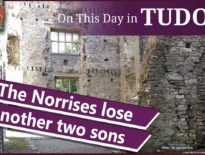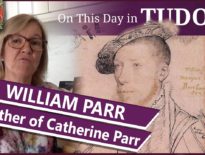On his day in Tudor history, 15th August 1588, Catholics Robert Wilcox, Edward Campion, Christopher Buxton and Robert Widmerpool were examined while imprisoned in the Marshalsea prison in Southwark, London.
These men ended up being executed, three of them for being Catholic priests and one for giving aid to priests. All four died with courage and in 1929 were beatified.
Find out more about these men and how they came to be executed in today's talk.
Also on this day in Tudor history, 15th August 1603, Lady Mary Scudamore (née Shelton), a member of Elizabeth I's Privy Chamber and one of her favourite sleeping companions, was buried at Holme Lacy in Herefordshire. Mary was very close to the queen but suffered the queen's wrath at one point. I explain all in last year’s video:
Also on this day in history:
- 1544 – Birth of Sir Peter Young, Scottish diplomat and tutor to the young James VI of Scotland, at Dundee.
- 1551 – Robert Dudley, the future Earl of Leicester, and his friend Barnaby Fitzpatrick, 2nd Baron Upper Ossory, were appointed as Gentlemen of Edward VI's Privy Chamber.
- 1552 – Death of Sir Anthony Wingfield, soldier and administrator, in Bethnal Green. He was buried at Stepney. Henry VIII named Wingfield as an Assistant Counsellor of his will and Wingfield served Henry's son, Edward VI, as Vice-Chamberlain of the Household, Comptroller of the Household and Exchequer Chamberlain.
- 1563 – Death of Thomas Argall, administrator in the reigns of Henry VIII, Edward VI, Mary I and Elizabeth I, at his house in Ivy Lane, London. He was buried in St Faith's under St Paul's. Argall is described by his biographer J.D. Alsop as being “one of the most prominent royal administrators of clerical revenue and accounts” between 1540 and his death in 1563.
- 1594 – Burial of Thomas Kyd, playwright, at St Mary Colechurch in London. Kyd is known for his play “The Spanish Tragedy” (c1587), and some scholars believe that he wrote a “Hamlet” play before that of William Shakespeare.
- 1610 – Death of Peter Lowe, surgeon and founder of the Royal College of Physicians and Surgeons of Glasgow, as it is now known, in Glasgow. He was buried at Glasgow Cathedral.
- 1612 – Death of administrator Sir Michael Hickes at Ruckholt in Essex from a “burning ague”. He was buried at Leyton Church in Essex. Hickes served William Cecil, Lord Burghley, as one of his principal secretaries and was close friends with Burghley's son, Robert Cecil.
Transcript:
On this day in Tudor history, 15th August 1588, Catholics Robert Wilcox, Edward Campion, Christopher Buxton and Robert Widmerpool were examined while imprisoned in the Marshalsea prison in Southwark, London.
Campion, Wilcox and Buxton were found guilty of being Roman Catholic priests, after all three of them confessed to being priests, and Widmerpool was charged with giving aid to a priest. They were executed by being hanged, drawn and quartered at Oaten Hill in Canterbury on 1st October 1588. Buxton was allegedly offered his life if he recanted his Catholic faith, but he refused, saying “I would not purchase a corruptible life at such a rate, and, if I had one hundred lives, I would willingly lay them all down in defence of my faith.”
Let me tell you a bit more about these men, who became known as the Oaten Hill Martyrs.
• Robert Wilcox was from Chester in the North-west of England, and was born in 1558. He studied at the English College, a seminary college, in Rheims, where he was ordained as a priest in 1585. He was sent on a mission, to convert English subjects to the old faith, i.e. Catholicism, in June 1586, but was arrested soon after his arrival. Accounts of their executions state that Wilcox was the first to climb the ladder to be hanged and that he did so with “great cheerfulness” and that when he was up there, he turned to his companions “with a smiling countenance” and “bid them be of good heart”, telling them “that he was going to Heaven before them, where he should carry the tidings of their coming after him.”
• Edward Campion, also known as Father Gerard Edwards, was born in Ludlow, Shropshire, and was educated at Jesus College, Oxford, before working in the household of Gregory Fiennes, 8th Baron Dacre, whose wife, Anne Sackville, was a staunch Catholic. He left England in February 1586 to study at the English College at Rheims and changed his name to Edward Campion, in honour of the Jesuit martyr Edmund Campion, who had been executed in 1581. He was ordained as a priest in 1587 and returned to England on a mission at Easter 1587. He was arrested in Sittingbourne, Kent, and imprisoned first at Newgate and then the Marshalsea.
• Christopher Buxton was born in 1562 in Derbyshire and was educated at Tidewell Grammar School under Nicholas Garlick, who went on to be martyred on 24th July 1588. Buxton then went to Rheims, to the English College there, and then on to Rome, where he was ordained in October 1586. He returned to England in September 1586, landing in Kent, and was arrested in that November and imprisoned in the Marshalsea.
• Robert Widmerpool was born in 1560 in Nottinghamshire and studied at Gloucester Hall, Oxford. It is said that he worked as a tutor to the sons of the Countess of Northumberland, a woman who had been implicated in the 1569 Northern Rebellion against Queen Elizabeth I. Widmerpool was arrested for giving hospitality to Catholic priests and for having introduced a priest into the home of the countess. At his execution, he is recorded as kissing the ladder and the rope, and giving God most hearty thanks “for bringing him to so great a glory, as that of dying for his faith and truth, in the same place where the glorious martyr St Thomas of Canterbury had shed his blood for the honour of his divine majesty”.
All four men were beatified in 1929 by Pope Pius XI.



Leave a Reply